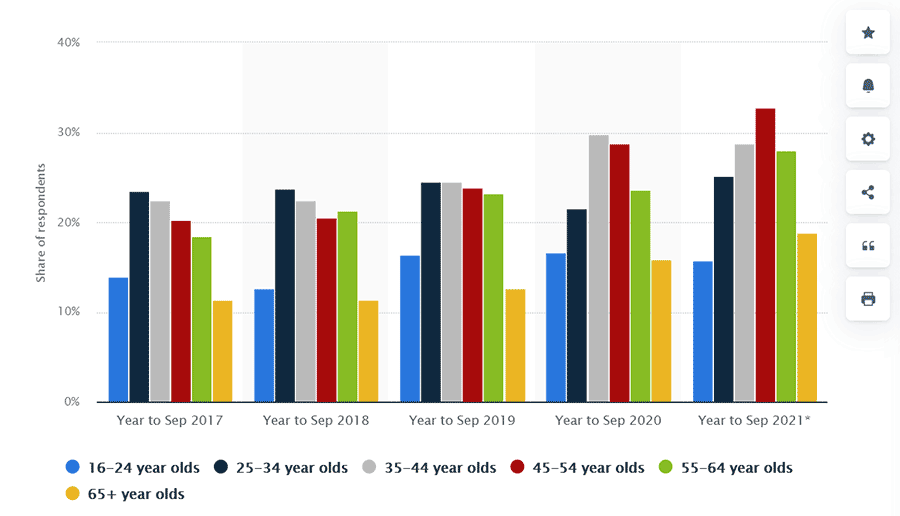
In the dynamic realm of online gaming, a landscape characterized by thrill-seeking players and competitive casinos, there stands a towering sentinel: the regulatory body.
For the UK, this sentinel is the United Kingdom Gambling Commission (UKGC), established with a clear mandate — to ensure player protection and maintain the integrity of the gaming industry.
Yet, recent trends suggest that the UKGC, in its quest for oversight, might inadvertently be constraining the very spirit of the industry.
Data from Focusbusiness.eu paints a revealing picture of the online gaming industry’s trajectory, pointing towards a staggering $12.8bn revenue projection for the UK by 2023 – 62% more than four years ago. Supporting this is the Statista.com data, which reiterates the UK’s increasing appetite for gambling since 2017. Set against this backdrop of burgeoning growth, the UKGC’s intensifying regulations appear incongruous.
Certainly, the motivations behind UKGC’s actions are beyond reproach. Who could argue against player protection or the need for a fair playing field? However, the real-world manifestations of these regulatory decisions are where eyebrows get raised. To begin with, there’s the undeniable economic pressure mounting on online casinos. With rising compliance costs, substantial licensing expenses, and the ever-present sword of Damocles in the form of potential fines, many platforms have responded by slashing their Return to Player percentages. This cascading effect directly impacts the player’s pocket, leading many to question the true efficacy of such rigorous regulation.
Next, let’s delve into the user experience — the very essence of online gaming. The UKGC’s interference in gameplay mechanics has disrupted the equilibrium. Impositions like slowed spins (which many argue may result in impatient players actually increasing the bet size), the axing of auto spins, and bans on bonus buys have diluted the thrill for veterans and placed barriers for novices. An even more contentious decision is the UK’s restriction on demo mode play; something that is unique to the UK. By mandating sign-ups before trial runs, the UKGC potentially nudges users closer to real gambling. This move, rather ironically, seems antithetical to the commission’s protective stance.
Furthermore, the UKGC’s push for “affordability” assessments has led to a growing concern amongst players regarding their privacy. Acting on the Commission’s guidance, bookmakers now request sensitive financial documents from their customers. This push for transparency can lead to players feeling excessively scrutinised. The Commission suggests operators to gauge “affordability” based on average income levels, setting thresholds that, once met, initiate more probing checks. This might mean demanding players provide documents such as three months’ payslips, P60s, tax returns or bank statements. While the intent is to foster responsible gambling, the question arises: At what point does regulation become invasion?

This complex regulatory web has an unintended consequence: driving players to uncharted waters — the unregulated casino market. An uncompromised gaming experience, free from bureaucratic shackles, is leading many UK gamers towards unlicensed casinos and platforms that exist beyond the UKGC’s gaze. This not only delegitimizes the commission’s efforts but also inadvertently strengthens the very grey and black markets they aim to combat.
The “nanny state” label, increasingly associated with the UKGC, encapsulates the mounting player frustration. Hemmed in by restrictions, many are voicing the underlying question: “Who genuinely benefits from such an iron-fisted regulatory regime?” While player protection was the advertised goal, the fiscal landscape shaped by these regulations — characterized by hefty fines and licensing fees — insinuates potential governmental financial gains.
An often underemphasized aspect of the current regulatory climate is the brewing unease within the industry itself. Conversations behind closed doors and hushed discussions at industry events hint at a pervasive reluctance to voice dissent against the UKGC’s decisions. Why this silence?
The answer lies in an unspoken concern: repercussions. Industry insiders and operators are wary of getting on the wrong side of the UKGC, apprehensive that any overt criticism might place them squarely on the commission’s radar. This isn’t merely about drawing attention; it’s the fear of potential punitive measures that might follow. The mere possibility of being subjected to more stringent reviews, steeper fines, or, in the worst-case scenario, having their licenses reevaluated, is a looming threat.
This environment of caution and, to some extent, self-censorship, raises an essential question about the dynamics between the regulator and the regulated. Is the regulatory landscape turning into one of intimidation rather than constructive oversight? Ideally, a regulatory body should foster an environment where stakeholders can express concerns and feedback without fear of retaliation. But the prevailing sentiment suggests a drift away from this ideal.
Engaging with the gaming community itself offers deeper insights. Within these circles, there’s an unmistakable nostalgia for the free-flowing gaming days of yore. Players articulate a desire for equilibrium — a world where oversight doesn’t stifle enjoyment.
Yet, it’s essential to underscore that every regulatory action spawns reactions, often unforeseen. The UKGC’s actions, reflecting its approach to governance, highlight the inherent challenges in regulation. The ever-evolving nature of online gaming demands that regulations be equally agile and adaptive. As players’ needs change and the industry innovates, so must the rules that govern them.
Moreover, in our connected digital age, the UK’s regulatory model sets precedents for other markets. If players feel suffocated and seek alternatives in unregulated spaces, it presents a global challenge, not just a local one. The ripple effects of these choices could reshape the online gaming landscape on a much broader scale.
Gambling isn’t merely a pastime; it’s rooted in our essence. From ancient civilizations using dice to today’s stock market ventures, the act of taking risks is ingrained in our DNA. Daily decisions, from career choices to investments, reflect our innate propensity to gamble. Recognizing this, it becomes clear that gambling transcends modern platforms—it’s a timeless facet of human behavior and will continue to be so.
To conclude, in an era where online gaming is more than mere entertainment — serving as a substantial economic force — crafting the right balance between oversight and operational freedom becomes critical. The onus is on the UKGC (and other regulators for that matter) to introspect and recalibrate its approach. A world where regulations resonate with both players’ aspirations and the industry’s overarching goals is the need of the hour.
Navigating the maze of regulations and understanding their implications can be complex. But in the words of Elon Musk, “Like Gulliver, tied down by thousands of little strings, we lose our freedom one regulation at a time.” This perspective underscores the necessity of maintaining a balance, ensuring that in the pursuit of protection, the essence of freedom isn’t compromised.
